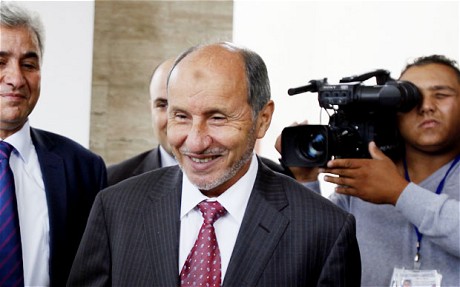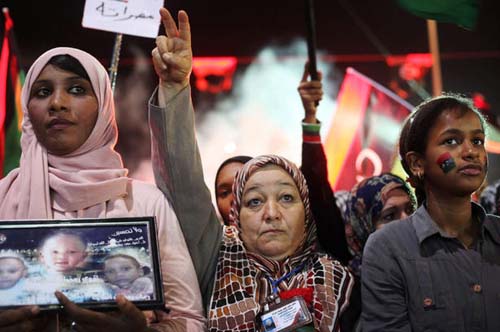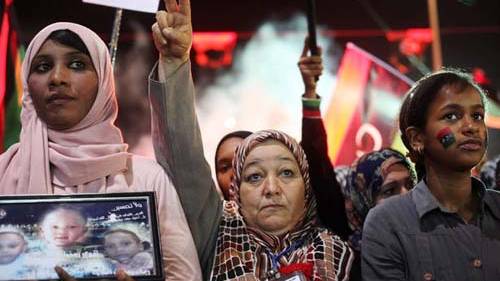Libya’s liberation: interim ruler unveils more radical than expected plans for Islamic law
Source: telegraph.co.uk
Libya’s interim leader outlined more radical plans to introduce Islamic law than expected as he declared the official liberation of the country.
Mustafa Abdul Jalil, the chairman of the National Transitional Council. Photo: AP
Mustafa Abdul-Jalil, the chairman of the National Transitional Council and de fact president, had already declared that Libyan laws in future would have Sharia, the Islamic code, as its "basic source".
But that formulation can be interpreted in many ways - it was also the basis of Egypt’s largely secular constitution under President Hosni Mubarak, and remains so after his fall.
Mr Abdul-Jalil went further, specifically lifting immediately, by decree, one law from Col. Gaddafi’s era that he said was in conflict with Sharia - that banning polygamy.
In a blow to those who hoped to see Libya’s economy integrate further into the western world, he announced that in future bank regulations would ban the charging of interest, in line with Sharia. "Interest creates disease and hatred among people," he said.
Gulf states like the United Arab Emirates, and other Muslim countries, have pioneered the development of Sharia-compliant banks which charge fees rather than interest for loans but they normally run alongside western-style banks.
In the first instance, interest on low-value loans would be waived altogether, he said.
Libya is already the most conservative state in north Africa, banning the sale of alcohol. Mr Abdul-Jalil’s decision - made in advance of the introduction of any democratic process - will please the Islamists who have played a strong role in opposition to Col Gaddafi’s rule and in the uprising but worry the many young liberal Libyans who, while usually observant Muslims, take their political cues from the West.
Article from: telegraph.co.uk

A girl flashes a victory sign as men stand in lie to see the body of former Libyan leader Muammar Gaddafi in Misrata October 21, 2011. Credits: REUTERS/Saad Shalash
Source
(Aug 2011) "As the hunt is underway for Gaddafi’s head, there is a dim idea on what the country he led will look like once control is officially turned over. The National Transitional Council has created a constitutional draft, but according to an online leak of the draft, the new Libya sounds like an oxymoron. To others it looks like yet another "US-introduced Iraq democracy" style."
Video from: YouTube.com
They point out that earlier statements from the National Transitional Council, the interim leaders, affirm “the Islamic identity of the Libyan People, its commitment to moderate Islamic values, its full rejection of extremist ideas and its commitment to combatting them in all circumstances.”
The council also rejected allegations of links with Al Qaeda.
“There seems to be a scare in the media about Islamism,” says former Libyan diplomat Abubaker Saad of Western Connecticut State University. “Libya has always been a religiously conservative country, but not an extreme one. Jalil said sharia would be the source of law, but the interpretation is very flexible. And so far he is just giving his opinion.”
Jalil’s announcement was a crowd-pleaser, Saad said, with the promise to restore interest-free loans from Islamic banks. He added that Jalil is a strong supporter of women’s rights, although with a Muslim slant.
“He will encourage them to participate, but they must wear the head scarf,” Saad said. “In Libya they have never imposed full veiling.”
[...]
But Libyan women will be watching any new restrictions closely, St John said. Under Gadhafi, gender discrimination was officially banned and the literacy rate for women climbed to 83 per cent. But women had few political and official roles, and marriage, divorce and inheritance laws favoured men.
Until the recent revolution, women’s freedom and opportunities to work were limited by marriage and domestic duties.
“It’s very disappointing that Jalil said that men could have more than one wife,” said St John. “Many women were very active in the revolution — spying, carrying ammunition and protesting. It’s going to make them very angry.”
Source

Women’s Libya?Libya’s transitional leader said the country’s new constitution will be based on Islamic law, which raised fears about what would happen to women’s rights in the traditionally secular country.
MANU BRABO/A
Also tune into:
Pepe Escobar - Invasion of Libya, Arab Spring & R2P
Pepe Escobar - Spoils of Libya, Iran & The Arc of Instability
Diana Johnstone - War on Libya: Perpretators & Manipulators






















